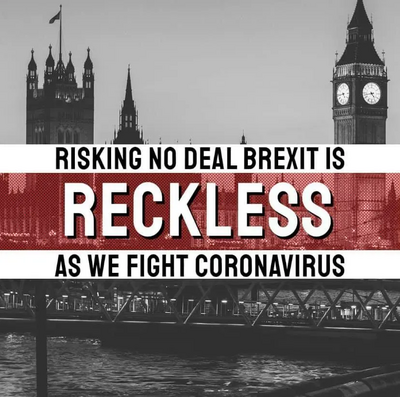Tory's reckless no-deal Brexit
Grim reading when considered alongside the impact of coronavirus on society.
Just these few reasons (and there are many more) here should be enough to warrant asking for an extension to the transistion period.
So if it happens the question that needs asking -
If a no-deal Brexit doesn't benefit Britain - Who does it benefits and why is it being pushed at the expense of the populace?
If a deal can't be agreed with the EU, the UK will default to World Trade Organization (WTO) terms from 1 January 2021. Every WTO member has a list of tariffs and quotas that they apply to other countries.
The UK would have to apply tariffs and quotas to goods coming into the country from the EU, and the EU would apply its "third-country" tariffs and quotas to the UK.
That means the UK would be hit by big taxes when it tried to sell products to the EU market. The bloc's average WTO tariffs are 11.1% for agricultural goods, 15.7% for animal products and 35.4% for dairy.
British car makers would be hit with a 10% tariff on exports to the bloc, which could amount to €5.7bn per year. That would increase the average price of a British car sold in the EU by €3,000.
Currently, trade between the UK and EU is tariff-free. But the Confederation of British Industry (CBI) predicts that no-deal would mean that 90% of the UK's goods exports to the EU would be subjected to tariffs.
WTO "most favoured nation" (MFN) rules mean that the UK couldn't lower its tariffs for any specific country or bloc, such as the EU, without agreeing a trade deal.
Without a deal, it would have to trade with every WTO member in the world on the best terms it offered any member, including the EU.
The Johnson government set out its non-preferential tariff rates and quotas on imports in the event the UK left the EU with no deal at the end of last year. The guidance was officially withdrawn when the UK agreed a transition period with the EU, but it may become relevant again if the UK fails to secure a trade deal with the bloc.
Borders
In the event of no-deal, the EU would begin imposing border checks on UK products from 1 January 2021, even if the UK hadn't changed any of its rules and regulations.
The UK government has admitted it expects massive border queues and persistent delays for six months or longer in the UK if it leaves without securing a deal.
France has said it plans to immediately implement post-Brexit border controls at its ports in the event of no-deal. The UK government has estimated that 50% to 85% of lorry drivers would not have the necessary documentation to enter the EU via France, says The Washington Post.
HMRC has estimated that British businesses would spend £15bn extra a year on paperwork in the event of a "no deal" Brexit, reports the Financial Times.
British and EU companies would face "a significant new and ongoing administrative burden", warns the government assessment.
Impact on economy
A small number of pro-Brexit economists say that most trade around the world is done on WTO terms, and the UK would still have access to the EU market, says Euro News.
But many other economists and academics say that crashing out and trading on WTO terms would be damaging for the British economy, hitting the service, manufacturing and agriculture industries hard.
The head of the WTO warned Johnson yesterday that standard trade terms "would slow Britain's recovery from coronavirus, saying that sticking closer to present arrangements would be better for jobs", The Times reports.
Roberto Azevedo, director-general of the WTO, said that the car industry and agriculture would be hit hard by a failure to secure a deal as they would be subject to heavy tariffs.
Speaking to the BBC's Andrew Marr Show, Azevedo said that while WTO terms were "not a catastrophe", they "will impose a number of adjustments and those can be painful, particularly for some sectors".

